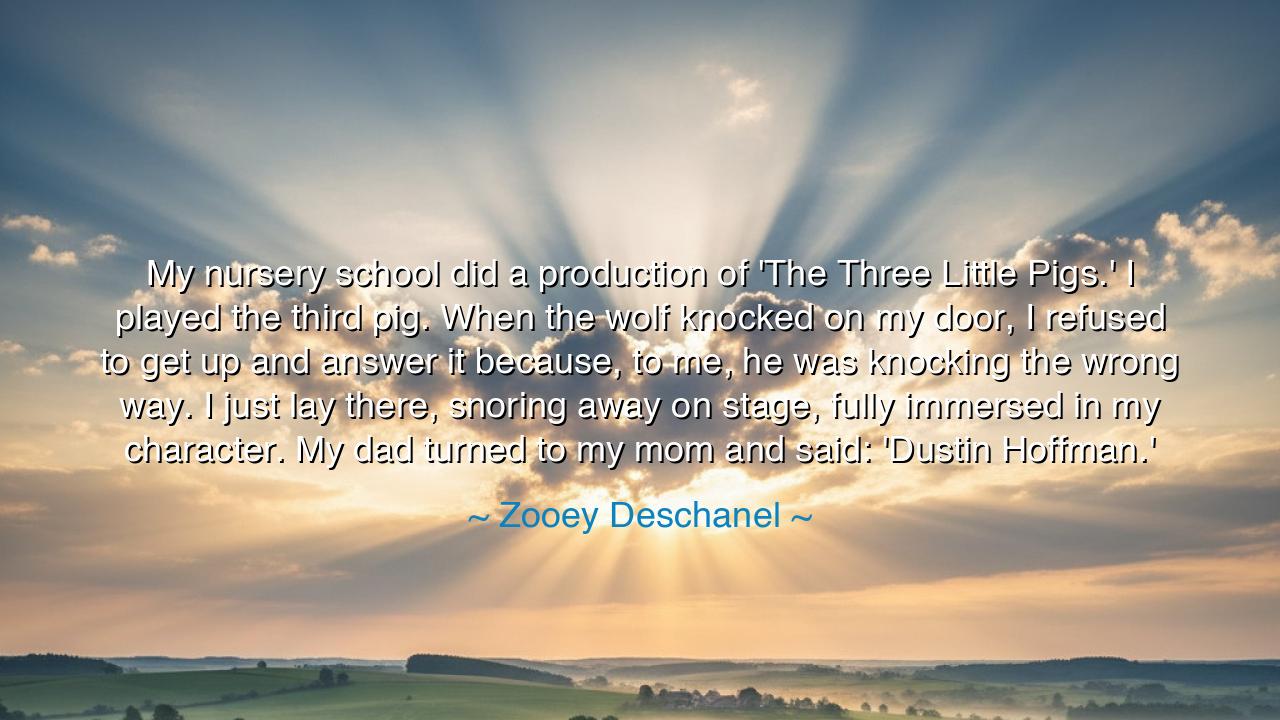
My nursery school did a production of 'The Three Little Pigs.' I
My nursery school did a production of 'The Three Little Pigs.' I played the third pig. When the wolf knocked on my door, I refused to get up and answer it because, to me, he was knocking the wrong way. I just lay there, snoring away on stage, fully immersed in my character. My dad turned to my mom and said: 'Dustin Hoffman.'






"My nursery school did a production of 'The Three Little Pigs.' I played the third pig. When the wolf knocked on my door, I refused to get up and answer it because, to me, he was knocking the wrong way. I just lay there, snoring away on stage, fully immersed in my character. My dad turned to my mom and said: 'Dustin Hoffman.'" — Zooey Deschanel
In this charming and whimsical recollection, Zooey Deschanel unveils more than a childhood anecdote—she reveals the essence of authenticity, of the spirit that breathes life into art, and of the quiet defiance that marks the true artist. Beneath the laughter of her tale lies a profound lesson: that to be genuine in one’s craft, one must be guided not by expectation, but by conviction. When the young Zooey refused to rise and answer the wolf’s knock, it was not out of stubbornness or mischief—it was out of instinct, the sacred intuition that whispers to every creator: “Stay true to what feels real.” In that moment, a child unknowingly embodied the ancient virtue of artistic integrity.
The origin of this quote lies in a family steeped in art and creativity. Zooey’s father, Caleb Deschanel, is an acclaimed cinematographer; her mother, Mary Jo Deschanel, an actress. Thus, from birth, Zooey was surrounded by storytelling—the union of image and emotion. Her story of the “third pig” is not merely about a school play—it is a reflection of her upbringing, where imagination and sincerity were valued above performance for performance’s sake. Her father’s whispered remark—“Dustin Hoffman”—was not mockery but recognition. He saw in his daughter the spark of an actor who, even as a child, would rather stay faithful to the truth of her character than surrender to expectation.
The deeper meaning of this story lies in the idea of devotion to authenticity, even when it confuses or frustrates others. The great actors and thinkers of history have always walked this path. Consider Dustin Hoffman himself, whose method acting transformed cinema. In preparing for Midnight Cowboy and Rain Man, he immersed himself so completely in his roles that his performances transcended imitation and became revelation. So too did Zooey Deschanel, in her tiny but sincere rebellion, show the seed of this same artistic truth: that the artist’s first loyalty is to honesty, not applause. It is this spirit that separates mere performance from art, imitation from creation.
But her story also carries a gentler lesson—one not only for artists, but for all who live with passion. The child’s sincerity is a form of wisdom that the adult world often forgets. In our haste to please, to conform, to “play our part,” we lose touch with that inner voice that tells us when something feels wrong. The little Zooey, lying on the stage, refused to betray her truth even in the face of confusion and expectation. That is the power of innocence—the courage to act from conviction, unshaken by the world’s demands. Authenticity, then, is not learned—it is remembered.
Throughout history, those who achieved greatness in their craft have dared to remain authentic, even when misunderstood. Think of Galileo, who refused to deny what his eyes revealed in the heavens, though the world mocked him. Think of Beethoven, who continued to compose symphonies he could no longer hear, remaining faithful to the truth of sound that lived within his soul. Such souls, like Zooey’s childlike self, refused to rise when the world knocked in the “wrong way.” They trusted their own rhythm, their own vision, their own inner truth—and through that, they touched the eternal.
Yet, let us not mistake this authenticity for arrogance or pride. The true artist—and the true human being—does not resist the world to defy it, but to honor the integrity of their own spirit. To stay true, one must first listen deeply to that still voice within, the one that knows when the knock upon the door is false. To live by this principle is to live with courage, even when others do not understand. For the world may demand that you perform on its terms, but the soul’s greatness lies in answering only to the truth that dwells within.
So, my child of the future, take this wisdom from Zooey Deschanel’s tale of the third pig: never abandon your truth for the sake of applause. Whether you are an artist, a thinker, or a dreamer, guard that sacred instinct that tells you what is right. The world may knock impatiently, demanding that you rise, but if the rhythm is wrong, stay still—listen, trust, and wait for your moment. For it is far better to “snore in sincerity” than to perform in falsehood. And when you do rise, rise in your own truth. For as this story reminds us, authenticity, not approval, is the true mark of greatness—and those who stay faithful to it, even in the smallest of moments, will one day be called artists of life itself.






AAdministratorAdministrator
Welcome, honored guests. Please leave a comment, we will respond soon